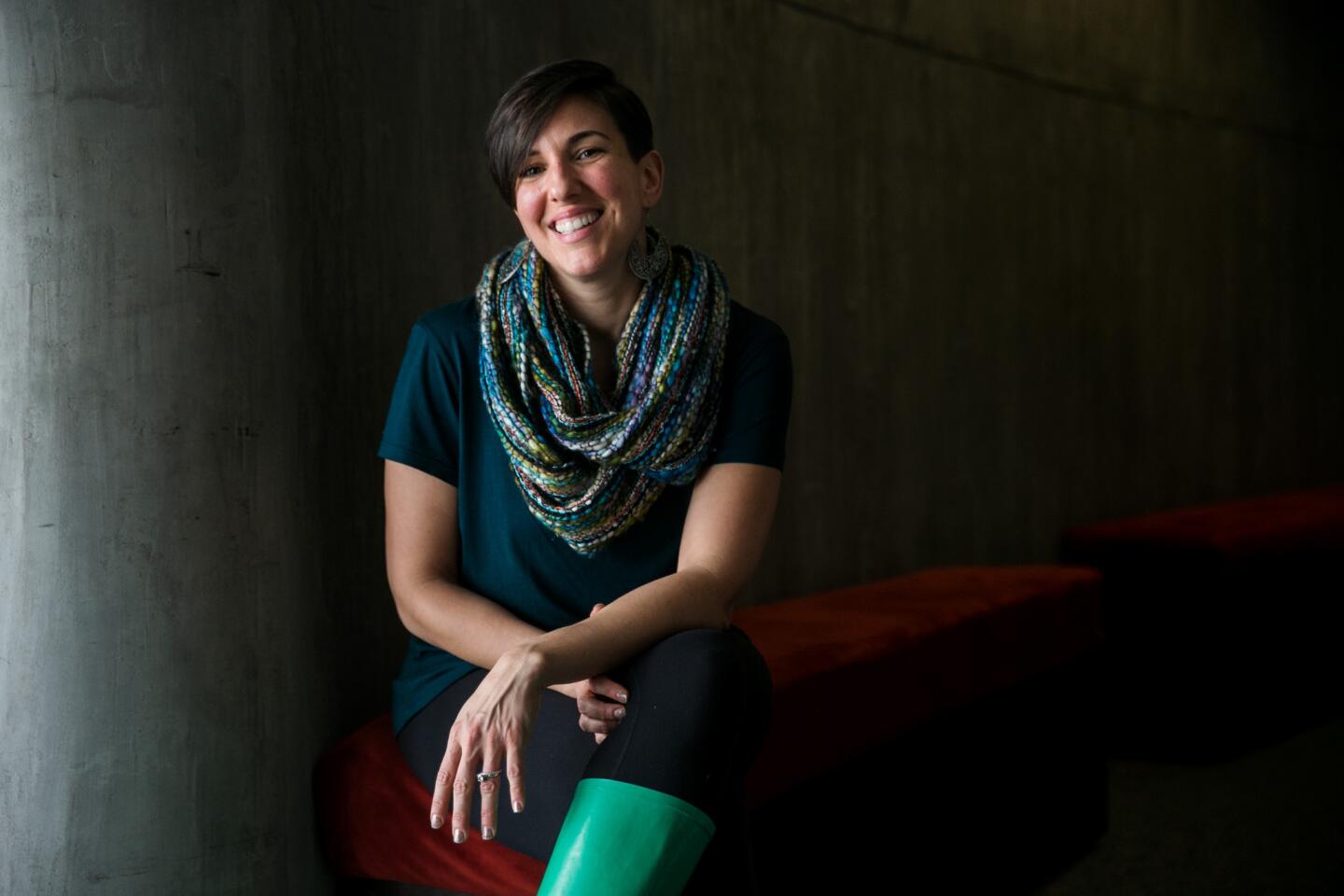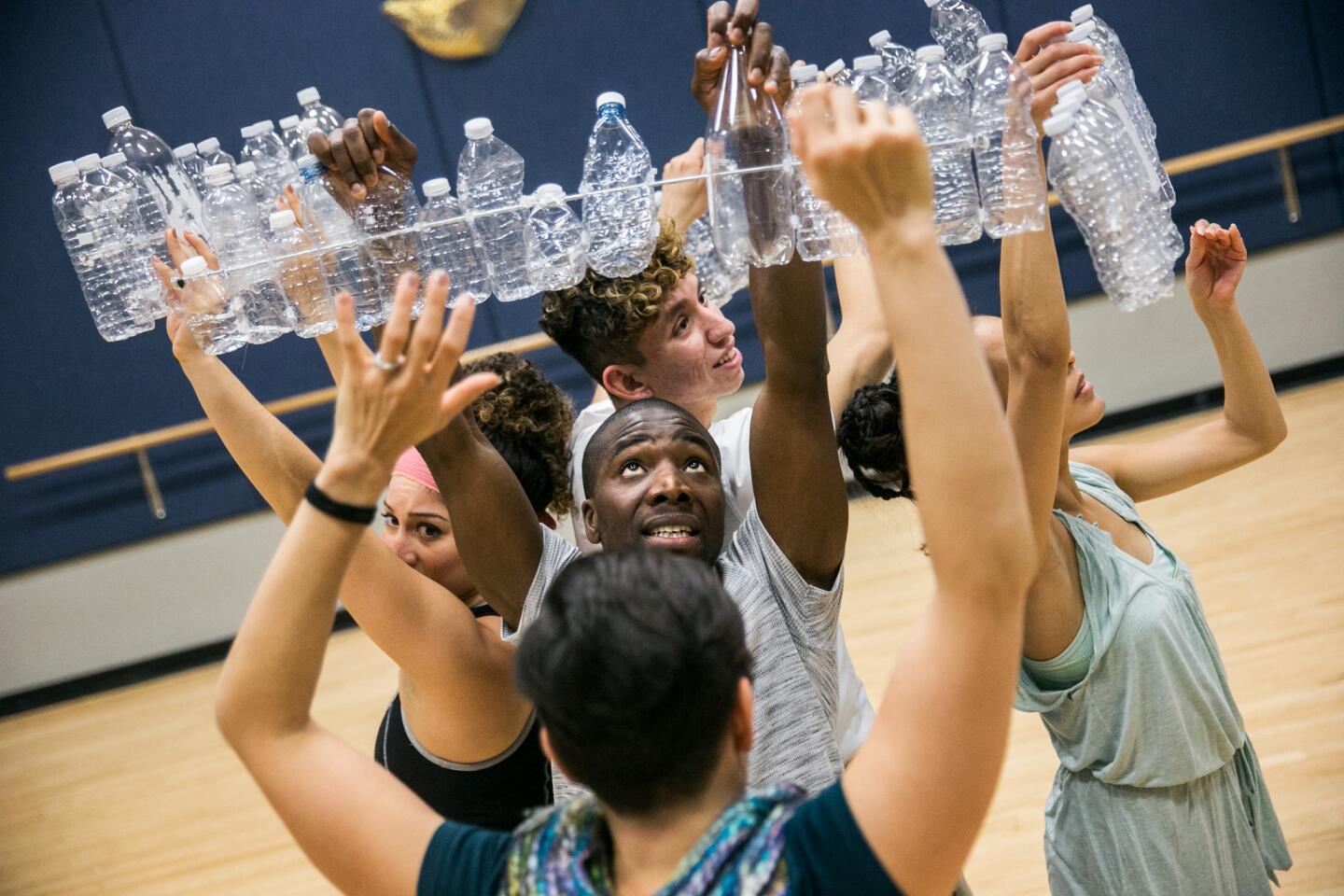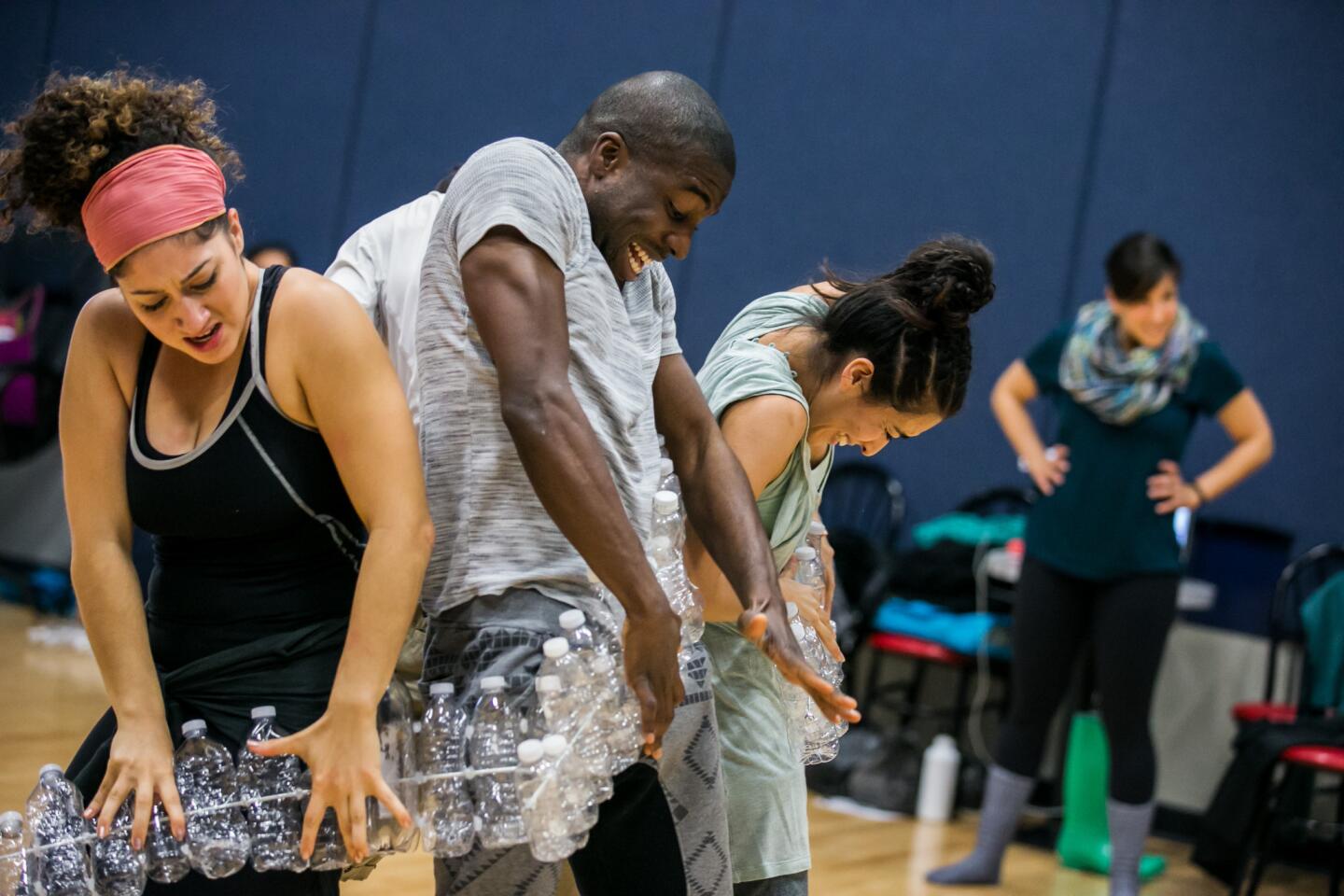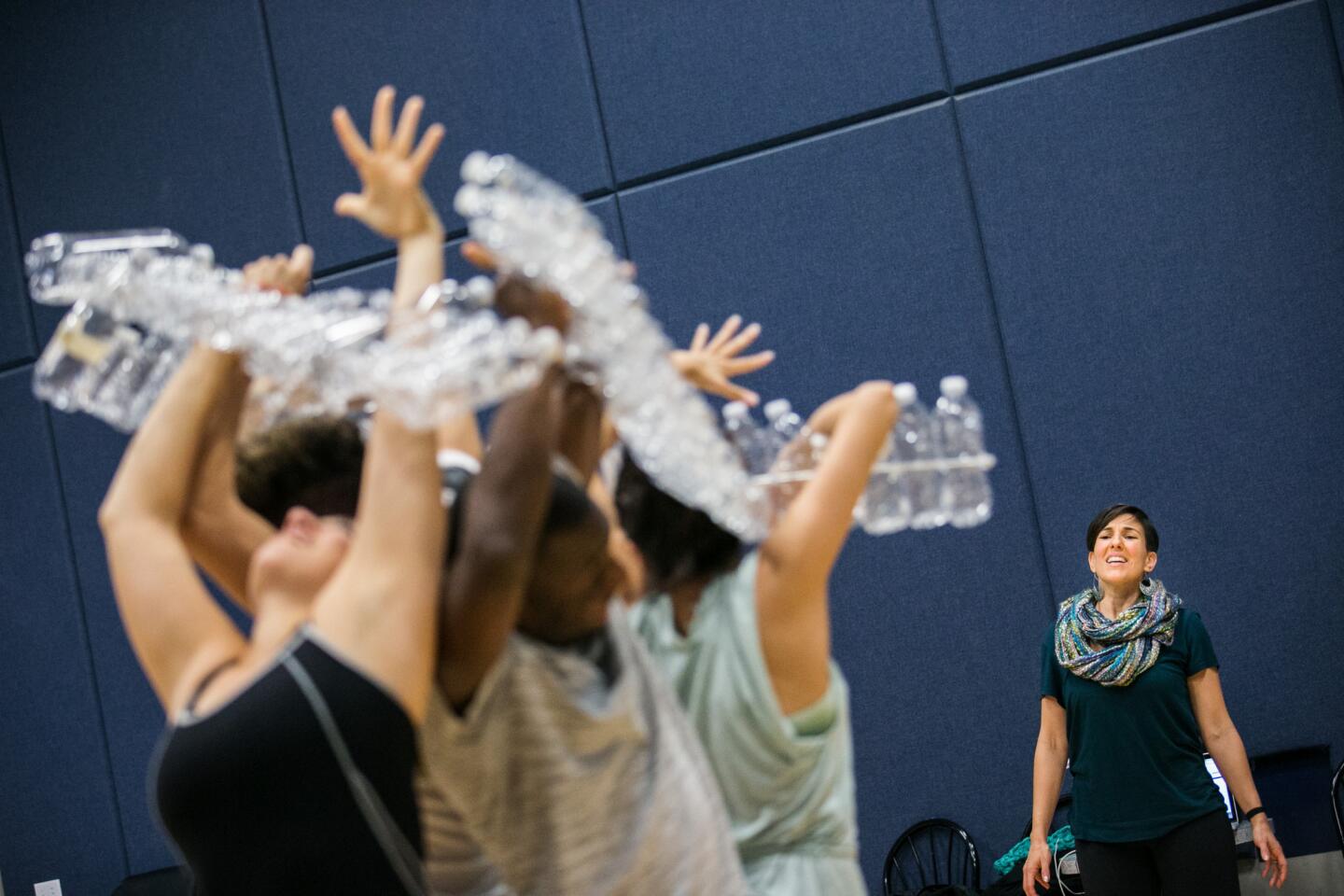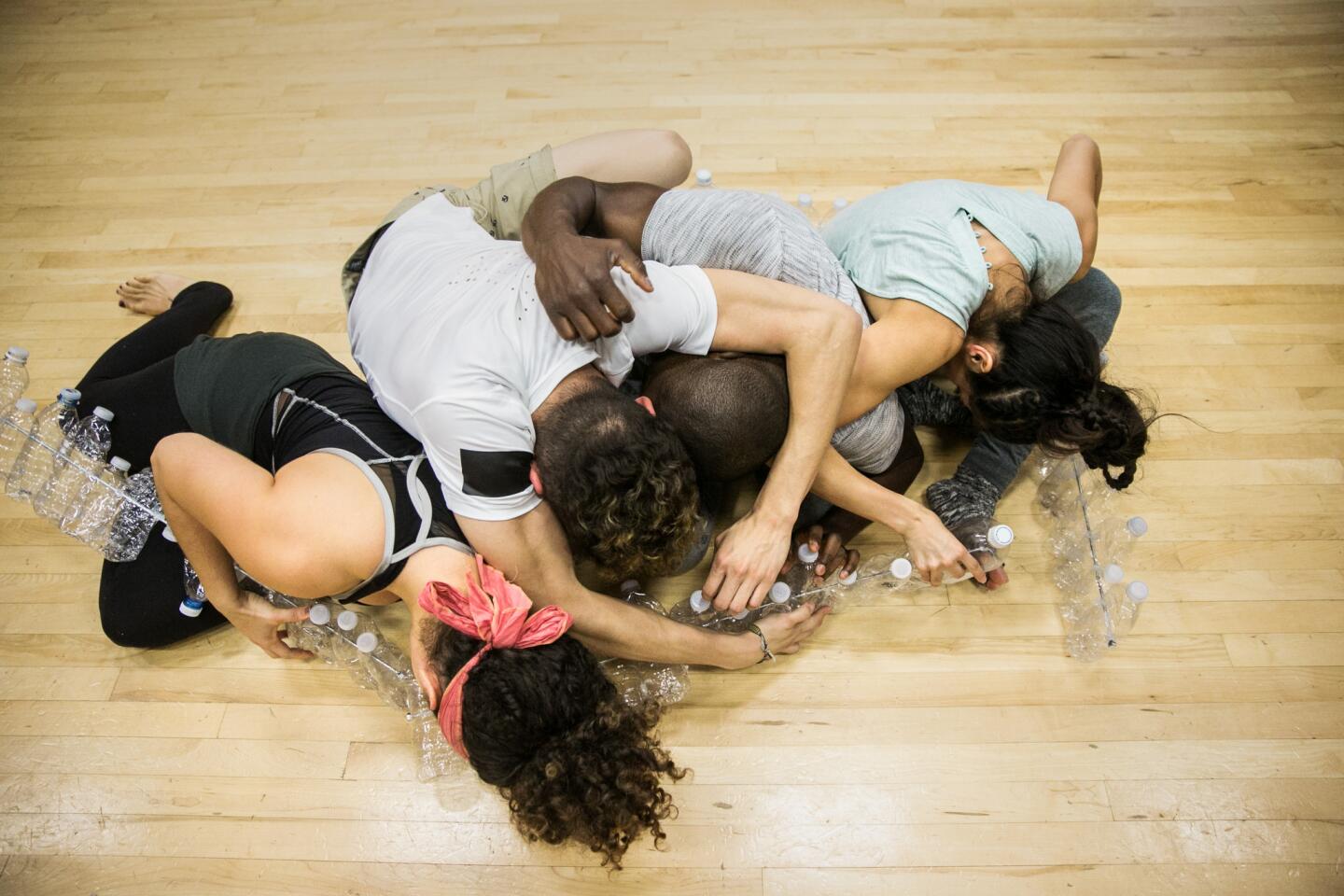Contra-Tiempo’s ‘Agua Furiosa’ stirs up a maelstrom of issues
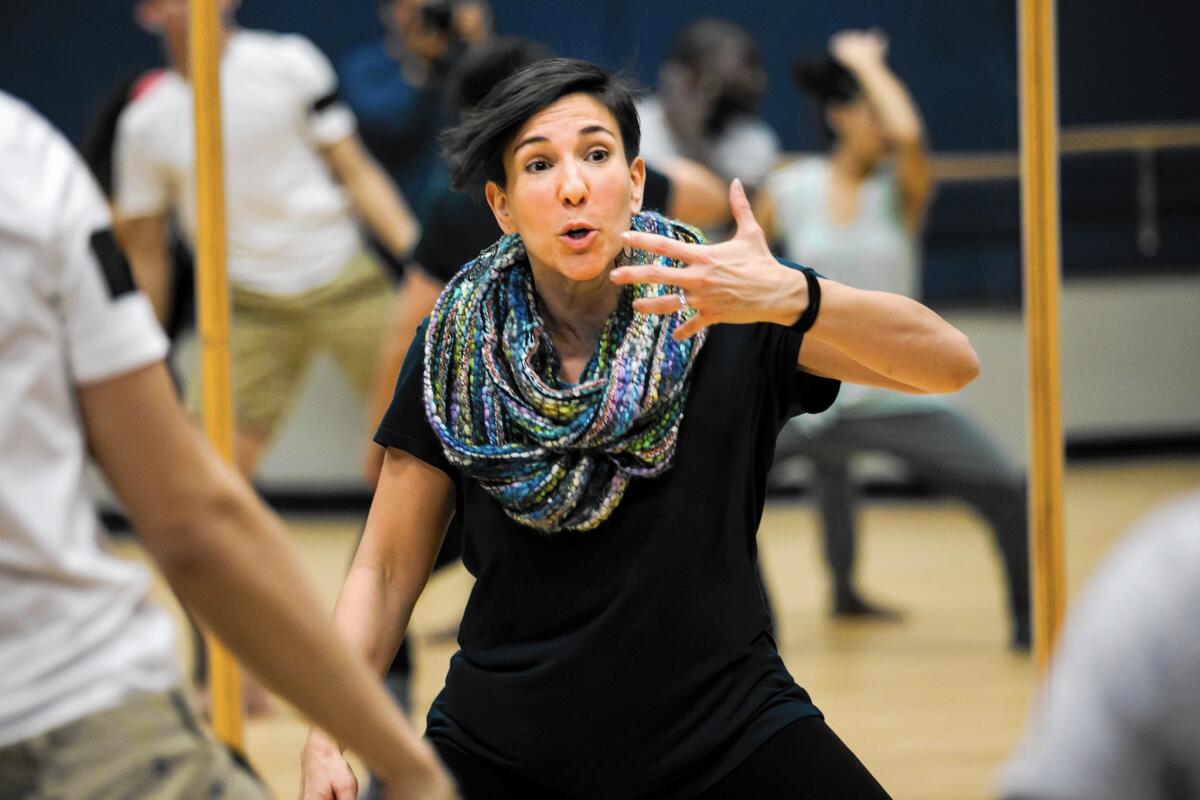
- Share via
Outside a modest midcity theater, the rainstorm is fierce. Angry sheets of water slam against the pavement, but inside, the storm is even more ferocious.
“Aaayaah!” yells choreographer Ana Maria Alvarez, turning up the volume on a track of primal drumbeating and high-pitched screaming in a small rehearsal space. Her dancers whip around one another in rolling, wave-like motions, as if being flung about by an ocean’s undercurrent. They raise their fists to the ceiling, shaking empty water bottles, the sharp crinkling and popping of plastic mixing with a chorus of percussion instruments, panting and shrieking.
Then the dancers collapse, melting into one another before falling apart, like loose parts of a rickety ship that has come undone in a tempest.
SIGN UP for the free Gold Standard newsletter >>
The activist-oriented contemporary dance company Contra-Tiempo is rehearsing its latest work, “Agua Furiosa,” which premiered at the Center for the Art of Performance at UCLA on Jan. 14. The piece, inspired by Shakespeare’s “The Tempest” and Oya, the Afro-Cuban god of wind and storms, encompasses racial conflict, economic inequity, gun violence and the politics of water and drought.
“The piece isn’t about any one of those things but about how they’re connected,” says Alvarez, founding artistic director of the Los Angeles company. “These issues swirl together to create a larger idea of society and who we are as human beings and how we’re grappling with nature.”
All of Contra-Tiempo’s work is highly political. Alvarez — who grew up in a bilingual household in the South with an American mother and Cuban father, both union organizers — founded the multilingual dance company in 2005 after completing her UCLA master’s thesis on salsa as a language of resistance. “Contra Tiempo,” or “Against the Times,” partly about immigration, was the first piece the company performed in 2006-07, in towns along the U.S.-Mexico border. The company’s most recently staged piece, “Full Still Hungry,” premiered at the John Anson Ford theater in 2011 exploring food politics and the economic effect of hunger in the U.S.
“Growing up the way I did, I always felt that my job as an artist was to figure out how to engage with society and create work that’s in conversation with what’s happening in the world,” Alvarez says. “And really have my art spark dialogue and be a catalyst for change, pushing forward ideas of community, love, compassion and justice.”
“Agua Furiosa” follows in that tradition of social responsibility, but the impetus for the work is also personal for Alvarez. She created the piece in response to feeling like she needed to better protect her now 5-year-old son, Sidney, from violence aimed at children of color.
“Every time you go on Facebook or Instagram, every time you turn on the television, we’re hearing about this incredible issue we’re having in our country right now where young men and women of color — kids — are being murdered by policemen, by vigilante neighbors who patrol people, and people keep getting off,” Alvarez says. “Our justice system has these loopholes where people can do this and it’s not a crime. So it feels like this incredible crime against humanity.”
Using “The Tempest” as a jumping-off point, she says, was her way of broaching that issue.
“It’s about family, exile, slavery, violence, patriarchy, nature — it takes on so much,” Alvarez says. “‘Agua Furiosa’ isn’t an adaptation of ‘The Tempest.’ It’s a counter-narrative to it.”
Like all of Contra-Tiempo’s work, “Agua Furiosa” blends salsa, Afro-Cuban movement, hip-hop and other forms of contemporary dance into what Alvarez calls urban Latin dance theater. But the production, featuring hip-hop and Afro-diasporic-influenced electronic music composed for the piece by Los Angeles sound artist d. Sabela grimes, is a bit of a departure in that it’s more heavily Afro-Cuban than salsa-influenced.
The work incorporates live performance from jazz vocalist Pyeng Threadgill and dance that’s alternately intense or soft and vulnerable. Interactive “call and response” chanting involves the audience and performers.
“We’re not doing this in isolation, we don’t want you to sit there and be quiet,” Alvarez says. “We want to know you’re out there and feel your engagement.”
The drought started about six months after Alvarez began composing the piece. Water imagery appears throughout the production; the performers dance in and around buckets of water, rattle and shake empty water bottles and deploy umbrellas. By the end of the show, Alvarez says, “let’s just say there’s water on the stage.
“We’re filling the space with the consumption of water as well as the emptiness of lack of water.”
Although Alvarez wrote and choreographed “Agua Furiosa,” the two-year process of creating it was highly collaborative. She incorporated personal stories from her dancers and other staffers. The company also worked with the community to further develop the piece through 10 months of choreographic labs around L.A. Members of the public gave verbal critiques of the work and participated in dance workshops and traditional Native American story circling.
That interactive process is as much what Contra-Tiempo is about, Alvarez says, as the resulting dance performance. Building community and using urban Latin dance to initiate a conversation about social justice are primary goals of the company.
Which is why, after the eight-night L.A. run of “Agua Furiosa” at UCLA, Contra-Tiempo will take the production on tour through eight cities in the South. At each stop, performers will hold workshops with the public at universities, local theaters and community centers to discuss race, compassion and social justice.
“I know the need for this kind of work in the South from my own experience growing up there as a woman of color,” Alvarez says. “Young people are our incredible hope in terms of transforming our culture — young people are the future. I know that may sound cliché, but I believe it in my deepest heart.”
More to Read
The biggest entertainment stories
Get our big stories about Hollywood, film, television, music, arts, culture and more right in your inbox as soon as they publish.
You may occasionally receive promotional content from the Los Angeles Times.
